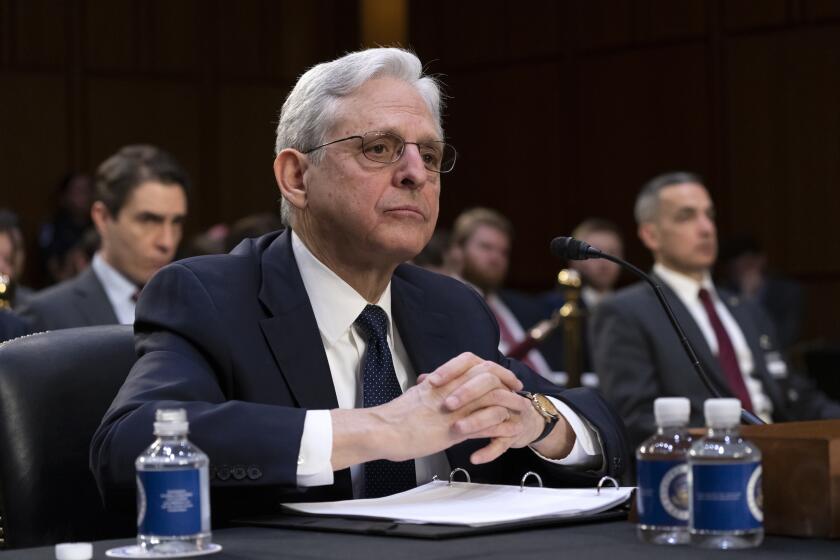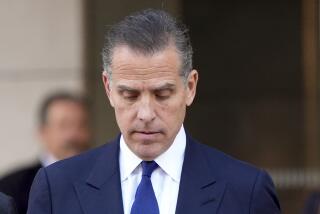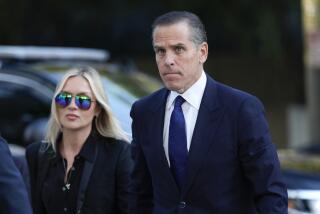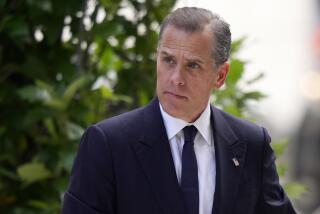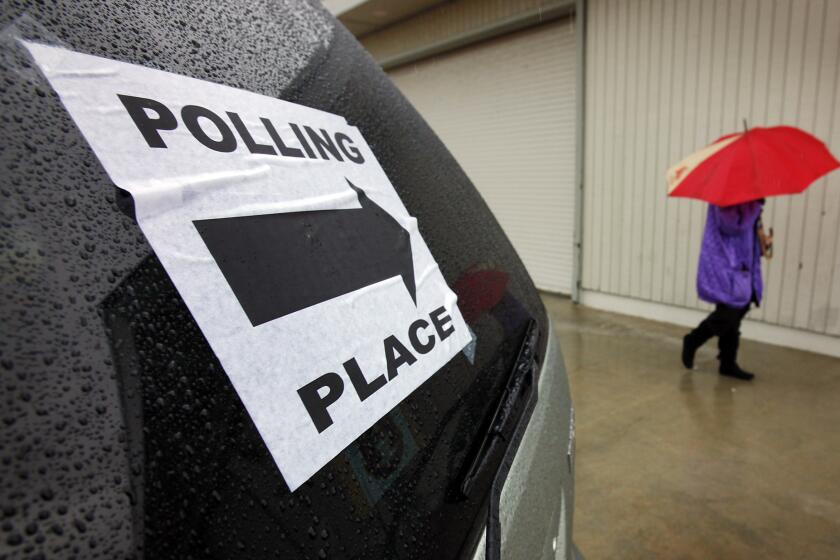Hunter Biden agrees to plead guilty to failing to pay federal income tax
President Biden’s son Hunter has been charged with failing to pay federal income tax and is expected to be charged with illegally possessing a weapon.
WASHINGTON — President Biden’s son Hunter Biden reached a plea agreement with the Justice Department on charges of failing to pay federal income tax and illegally possessing a weapon, according to a letter filed Tuesday in U.S. District Court in Delaware.
The letter states that Biden will plead guilty to misdemeanor tax offenses. Under the agreement negotiated with the U.S. attorney’s office in Delaware, Biden will acknowledge his failure to pay taxes on income he received in 2017 and 2018. In exchange, prosecutors will recommend probation, and he is likely to avoid prison time.
He will also enter a diversion program to avoid pleading guilty to a felony charge of illegally possessing a firearm as a drug user.
Biden has said he did not pay the taxes while he was in the depths of drug addiction after the 2015 death of his brother, Beau. He has already paid the outstanding taxes.
The agreement means President Biden will not have to contend with the diversion of a trial for his son as the presidential race ramps up and his campaign tries to avoid negative publicity.
Hunter Biden’s counsel Chris Clark said in a statement that it is his understanding that the five-year investigation into his client has ended.
“I know Hunter believes it is important to take responsibility for these mistakes he made during a period of turmoil and addiction in his life. He looks forward to continuing his recovery and moving forward,” Clark said.
David Weiss, the U.S. attorney in Delaware, said in a separate statement that the investigation is continuing.
The Trump administration opened the probe in 2018, and Republicans have since made it a core part of their political messaging. After President Biden’s inauguration, Republicans accused the new administration of failing to aggressively pursue the case.
When he took office in 2021, Biden kept on Weiss, a Trump appointee, who conducted the Hunter Biden investigation.
As Biden campaigned Tuesday in California, aides at the White House maintained their distance from the Justice Department investigation, offering a terse “no comment.”
The West Wing corridors, typically buzzing with staff and senior officials, were quiet despite the political implications of Hunter Biden’s deal for the 2024 presidential election.
“The president and first lady love their son and support him as he continues to rebuild his life,” White House spokesman Ian Sams said in a brief statement. “We will have no further comment.”
Biden, who was in San Francisco on Tuesday to meet with experts and researchers to discuss artificial intelligence, later told reporters, “I’m very proud of my son.”
White House officials have emphasized that the president has sought to preserve the Justice Department’s independence and has not spoken to Atty. Gen. Merrick Garland about any investigations into any member of his family.
United States of America v. Robert Hunter Biden agreement
Republicans criticized the agreement Tuesday as weak and unfair to other defendants. It comes days after a 37-count federal indictment was unsealed against former President Trump accusing him of mishandling classified documents and refusing to return them when ordered to under subpoena. That trial is scheduled to begin Aug. 14, though the date is expected to shift.
“Hunter Biden is getting away with a slap on the wrist,” House Oversight Committee Chair James Comer (R-Ky.) said in a statement. He said the agreement will not affect the committee’s investigation into Hunter Biden’s foreign business dealings.
Republican House members attempted to paint the agreement as lenient, with Speaker Kevin McCarthy (R-Bakersfield) telling reporters that it illustrates a “two-tier” justice system in America.
“If you are the president’s leading political opponent, the DOJ tries to literally put you in jail,” McCarthy said. “If you are the president’s son, you get a sweetheart deal.”
Rep. Doug LaMalfa (R-Richvale) said in a statement to The Times that lawmakers should find out where Hunter Biden “got the money to pay off his tax bills and various debts from his addictions.”
“There needs to be a thorough investigation of the Bidens’ financial dealings overseas and scrutiny of the Justice Department’s handling of the investigation,” LaMalfa said.
Franklin Zimring, a criminologist at UC Berkeley, said Republicans should be cautious about making assessments of the agreement in Hunter Biden’s case without more detailed information.
“That kind of characterization depends upon much more detailed knowledge of how they handle otherwise similar cases than I think they have,” Zimring said.
Maryland Rep. Jamie Raskin, the ranking Democrat on the Oversight Committee, said the fact that a sitting president’s son was charged with federal crimes without the president trying to intervene is a sign of the justice system working.
“This development reflects the Justice Department’s continued institutional independence in following the evidence of actual crimes and enforcing the rule of law even in the face of constant criticism and heckling by my GOP colleagues who think that the system of justice should only follow their partisan wishes,” he said in a statement.
Atty. Gen. Merrick Garland told the Senate Judiciary Committee he has left the matter in the hands of U.S. Atty. David Weiss, the top federal prosecutor in Delaware, who would be empowered to expand his investigation outside the state if needed.
It is unclear whether the Justice Department is investigating any of the other allegations Republicans have levied against Hunter Biden.
In March, the House Oversight and Accountability Committee published a memo accusing Hunter Biden, other family members and their companies of having “collectively received $1.3 million in payments from accounts related to Rob Walker, a Biden family associate” between 2015 and 2017. In March 2017, the memo alleged, Chinese company State Energy HK wired $3 million to Walker’s company.
The agreement released Tuesday also states that Hunter Biden possessed a Colt Cobra .38 special handgun in 2018 while he was a drug user. Federal law bars “unlawful users” of illegal drugs from owning firearms. The charge carries a maximum sentence of up to 10 years in prison, but the Justice Department agreement with Hunter Biden states that he will avoid that charge by attending a diversion program.
Adam Winkler, a UCLA law professor who studies gun policy, said the diversion program is a “very common” alternative to a prison sentence.
“Especially for first-time offenders who have not committed any violence, this kind of diversion program has been favored by the justice community as a way of rehabilitating people without forcing them into prisons, which we know are dangerous and hostile and sometimes violent places,” Winkler said.
Hunter Biden is not the first close relative of a president whose conduct has brought unwanted scrutiny.
Former President Trump’s children Ivanka and Donald Jr. narrowly escaped a fraud indictment in 2012, according to a ProPublica investigation. They, along with Eric Trump and their father, are currently facing a civil lawsuit from New York Atty. Gen. Letitia James alleging financial fraud.
Donald Nixon received a loan from a wealthy businessman as his brother Richard Nixon was running for California governor, a development that Nixon’s political opponents cited as an example of undue influence. Later, as president, Nixon ordered the wiretapping of his brother to keep tabs on his business deals.
After leaving office, former President Clinton issued a statement in 2001 saying he and his wife, then-Sen. Hillary Rodham Clinton, were “deeply disturbed” upon learning that Hillary Clinton’s brother, Hugh Rodham, had received $400,000 to secure presidential pardons for two men convicted of federal crimes. Rodham agreed to return the money.
In 1980, the U.S. Senate opened an investigation into Billy Carter, brother of then-President Carter, following trips he made to Libya and his registration as a foreign agent after receiving more than $200,000 from the Libyan government. The president tried to distance himself from his brother’s business amid his unsuccessful reelection bid against Ronald Reagan.
Times staff writer Queenie Wong contributed to this report.
More to Read
Get the L.A. Times Politics newsletter
Deeply reported insights into legislation, politics and policy from Sacramento, Washington and beyond. In your inbox three times per week.
You may occasionally receive promotional content from the Los Angeles Times.

